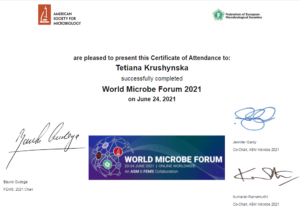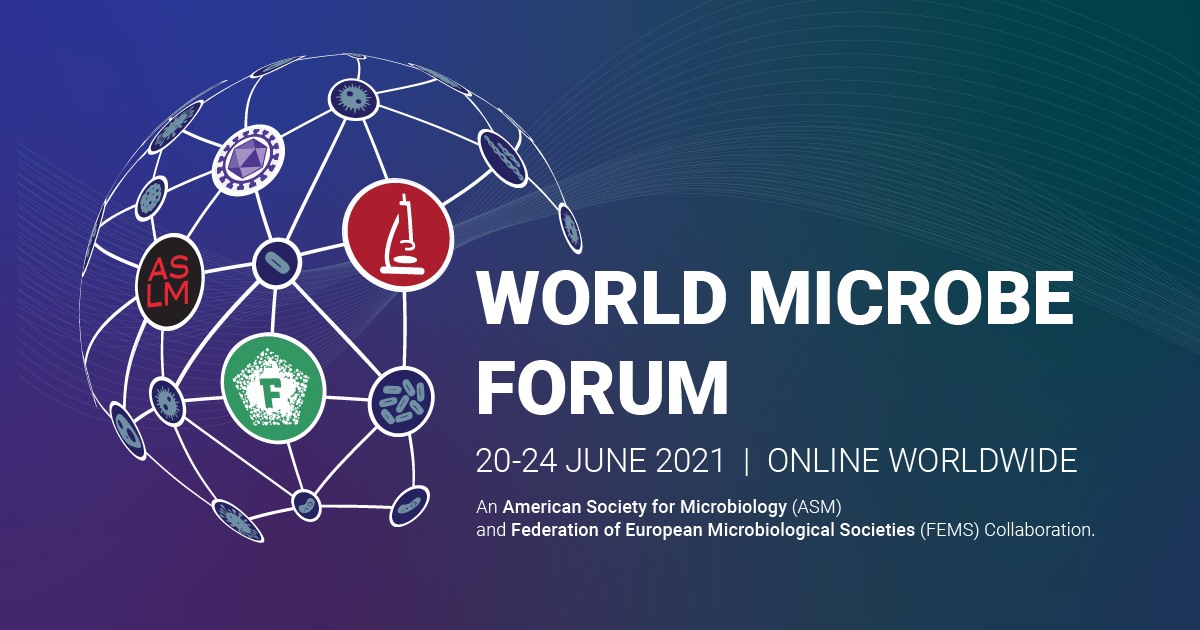As a medical student, I can see many problems in prescribing antibiotics without testing, so a topic like “antibiotic resistance” is interesting for me. Also, with the current Covid situation, a lot of new medications are now on the market and much speculation concerning this subject, so I would like to get more information on “Vaccines and Immunization Science.
That is why the World Microbe Forum on June 20-24, 2020 attracted my attention.
There were a wide range of scientific topics closely bind to new researchers and clinical practice on the Forum.
A lot of great, relevant information such as new infectious pathogens like SARS-CoV-2, antimicrobial resistance and the role of microbes in climate change, changing of fungal infections and new in antifungal drug discovery, vaccine hesitancy were discussed on the Forum.
I am going to share those reports between medical student community and provide such actual information on social media.
I would like to thank the US-Ukraine Foundation Biotech Initiative for the grant which allowed me to participate at the World Microbe Forum this year.
-Olena Andriiashyna, student, Dnipropetrovsk Medical Academy
 For me, it was an inspiring and energizing experience to participate in the World Microbe Forum which was a unique gathering of 6000 microbiologists from 115 countries covering cutting-edge, interdisciplinary microbial sciences research. Its digital platform provided unparalleled access to the latest innovative research across global perspectives in clinical and public health microbiology, host-microbe biology and vaccines, microbial ecology and evolution, and, what was of my particular interest, in microbiological education.
For me, it was an inspiring and energizing experience to participate in the World Microbe Forum which was a unique gathering of 6000 microbiologists from 115 countries covering cutting-edge, interdisciplinary microbial sciences research. Its digital platform provided unparalleled access to the latest innovative research across global perspectives in clinical and public health microbiology, host-microbe biology and vaccines, microbial ecology and evolution, and, what was of my particular interest, in microbiological education.
During those five days of the Forum I took part in Joint General Session, interactive and on-demand symposia, career talks, and fast-track sessions. I presented my research as an iPoster in the virtual Poster Hall and viewed a lot of superb posters displayed there.
I got bright ideas about teaching and learning microbiology in the time of the Covid-19 pandemic crisis, the development of online lab courses, mentorship in academic settings, using art as a tool for microbiology education. I expect to share them with my university colleagues and implement them in the learning process in our department.
Of course, it was impossible to attend the 500 scientific sessions scheduled at the World Microbe Forum. Fortunately, almost all the presentations, videos, and exhibitions stay available for the end of July as well as communication with experts and peers worldwide. This encourages me to catch up on the materials about the human microbiome that I missed.
The World Microbe Forum ended but research by international microbiologists keeps advancing.
- Tetiana Krushynska, Associate Professor, Dnipropetrovsk Medical Academy of the Ministry of Health of Ukraine
The World Microbial Forum - the most significant event for microbiologists all around the world - was held from 20 to 24 June. Despite the physical distancing caused by the pandemic, microbiologists gathered in digital format for a unique event involving advanced interdisciplinary research in microbial sciences. The forum was held under the slogan that microbiology, like microbes, knows no boundaries. This year, the American Society for Microbiology (ASM) and the Federation of European Microbiological Societies (FEMS) co-organized the forum for further development of science and to help answer the most important questions affecting humanity today.
The World Microbial Forum covered a wide range of issues, from new infectious pathogens such as SARS-CoV-2 to antimicrobial resistance as well as the role of microbes in climate change, biosphere and evolutionary processes, clinical and agricultural microbiology, molecular biology, and physiology. It also included questions about professional development and education in microbiology, including knowledge dissemination.
International experts were gathered during this unique event to discuss and propose solutions for the spot on problems we face today. The forum participants were offered unprecedented access to the latest innovative research on a worldwide scale.
The participation in the World Microbe Forum allowed us to join the scientific program without borders to demonstrate our scientific achievements in a virtual space which was highlighting the latest and the most advanced research and progress in this field globally as well as opened innovative approaches for assessing the quality of own research during the discussion with audience and scientists with different experience before submitting for publication.
The World Microbe Forum was presented live, in-session and on-demand sessions. It included joint general sessions and symposia related to various issues of research, short Fast-Track with 1-2 speakers on a specific topic, meetings with experts and plenary sessions with speakers with experience attractive for a wide audience. Сareer-oriented questions were also discussed. Various courses with an opportunity to obtain relevant credits were available as a part of continuing education. Sponsorship content was presented in the Exhibition hall. The communication was taking place live and in text chats. A Community Corner and After Chats were created for informal meetings to facilitate the further collaboration of participants.
In total, about 500 sessions were held and more than 3,000 interactive posters were presented in cyberspace. The forum was attended by 6,000 scientists from 115 countries. Ukrainian microbiologists also joined the international community with 24 poster presentations.
We have been inspired and encouraged by the cutting-edge advances of science, established contacts with the global network of active researchers and acknowledged leaders in our field as well as the opportunity to demonstrate research results and receive valuable and diverse feedbacks that advance the career.
The Forum’s materials will be incorporated into courses on medical microbiology and epidemiology for medical students.
We are waiting for the next ASM Microbe which will take place in Washington on June 9-14, 2022.
- Dmytro Stepanskyi, Head of the Department of Microbiology, Virology, Immunology and Epidemiology at Dnipro State Medical University

